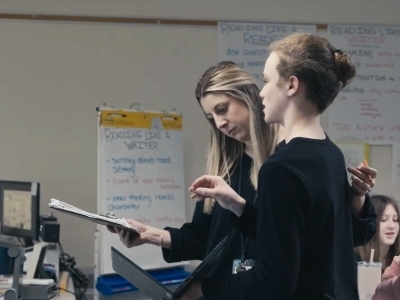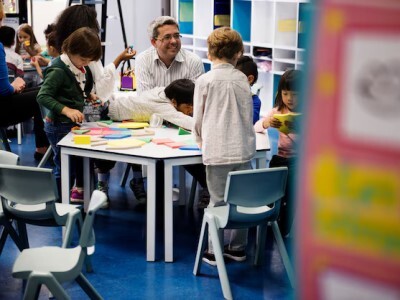How Next Gen Learning Can Support Student Agency
Topics

We’ve all had the experience of truly purposeful, authentic learning and know how valuable it is. Educators are taking the best of what we know about learning, student support, effective instruction, and interpersonal skill-building to completely reimagine schools so that students experience that kind of purposeful learning all day, every day.
Practitioner's Guide to Next Gen Learning
Ownership. Freedom. Respect. Trust. Courage. Souls on Fire. Find out what student agency is and why it’s so important to education today.
Student agency is one of the reasons why next gen learning looks and feels different from traditional instructional practices.
Despite the best of intentions, whole group instruction that is teacher-centered or curriculum-centered tends to ignore the agency of individual students to own their learning and direct their own path through it. When student agency is embraced, the instructional model shifts to a student-centered learning model.
For educators, the shift can be messy, uncomfortable, and hard. As a parent, I get it because I struggle with honoring the agency of my kids as I parent them. I wholeheartedly want my children to be agents of their own lives, growing into adults who are empowered to question the world and confident in their ability to change it for the better. But today, I just want them to put on their shoes so we can get to school on time, to wear sneakers instead of flip flops because it’s cold outside, and to do it in the next three minutes! Under the pressure to get out the door, I ignore what choices they want to make now and what they will need to learn to do for themselves as they grow up.
The shift to embracing student agency is messy, uncomfortable, and hard, but the payoff is priceless. The guest experts in December’s #NGLCchat on Student Agency—Grace Belfiore, Dave Lash, Andrew Miller, Casey Montigney, and Michele Savage—have the passion and commitment and strength and expertise to recognize the agency within students, enabling them to be agents of their own learning today and their own success tomorrow. In this post, I’ll share what they and the other chat participants taught me about what student agency is, why it’s so important, and how it can be promoted and supported in the classroom.
Why Student Agency Is So Important
Why are we talking about Student Agency? Because agency underpins the whole broader, deeper range of MyWays competencies needed for student success. And today’s students NEED the skills to be lifelong learners:
Harvard professor Roland Barth has observed that in the 1950s when young people left high school they typically knew about 75% of what they would need to know to be successful in life. Today, he predicts that young people know about 2% of what they will need to know. (Barth, R.S. (1997, March 5). The leader as learner. Education Week, 16(23). 56.) This shift is not because young people are learning less than previous generations. In fact, there is good evidence that they know much more. The force behind this change is the rapid and ever-increasing pace of change, the complexity of the world in which we live and the unpredictability of what people will need to know in the coming decades—the future for which we are preparing today’s learners.
Understanding Student Agency
Student agency is a bold concept, demonstrated by the words #NGLCchat participants used to describe what student agency requires and how it is exhibited:
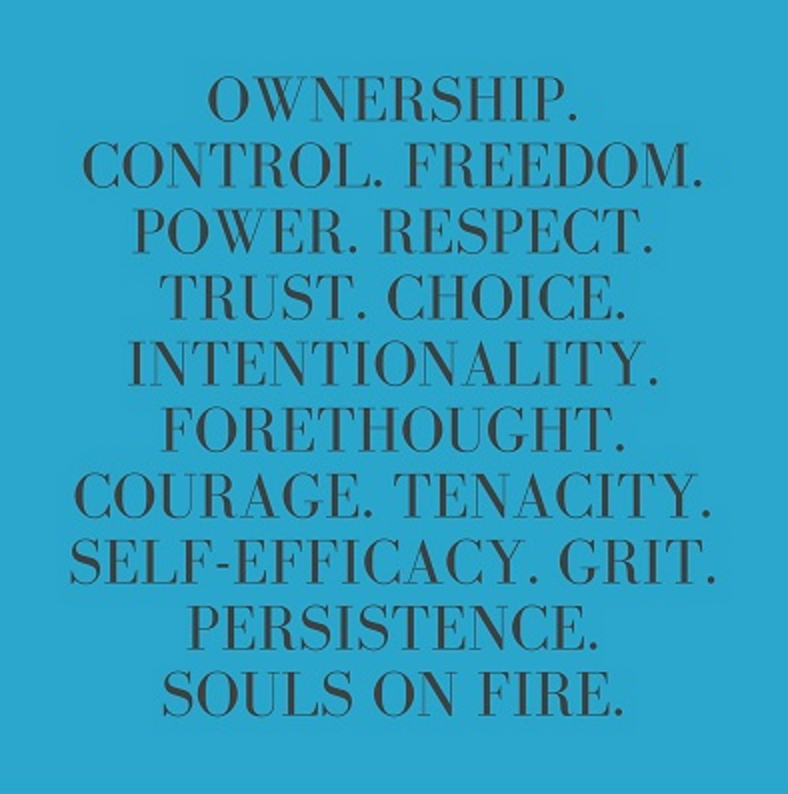
But student agency is more complex than what is captured in a collection of related words.
Ownership & Persistence: Agency is present when students take charge of who, what, where, why, and when they learn. This includes choice, self-awareness, self-management, social relationships, responsible decisions, time management, organization, and self-regulation on the way to a long-term, personalized goal.
Agency also requires resilience, tenacity, and grit. It involves persistence to tackle challenges, to use failure along the way to success, and to embrace curiosity, creativity, and innovation as essential as breathing.
Students exhibit agency when they persevere, not just feeling in control but having the skills and tools to persist when challenged. We don’t give young people enough credit for their ability to take on significant challenges, and facing challenges may be a necessary prerequisite for becoming strong adults.
A Student’s Perspective: What conversation about student agency is complete without asking students what they think? One thread during the chat looked to the EdSurge article by Davidson College student Andrew Rikard who defines agency as recognizing the responsibility to take action in a world that needs makers and creators. He also said that agency isn’t something you give or take, it’s collaborative. It is a two-way street, part of a school’s culture. Armaan Ismail, a student at Incubator School, started another thread of conversation when he joined the chat, this one about freedom:
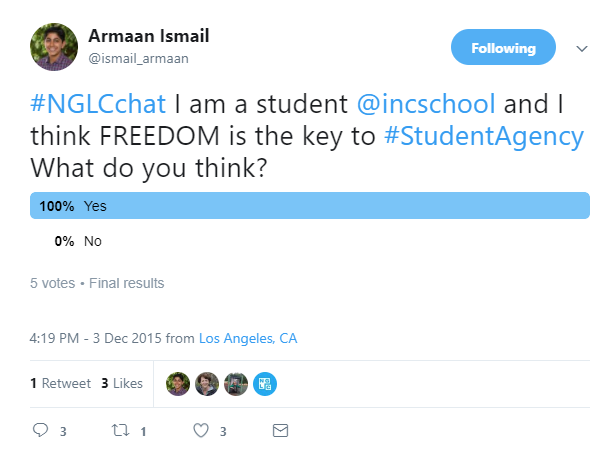
Empowerment, not Learned Helplessness: Another thread during the chat focused on how children recognize their agency in relation to their environment. Agency is being in control of what happens around us, where we can influence events. And that starts with children believing that they can actually change or reshape their environment through their actions. When the environment is unpredictable, turbulent, and non-responsive to a child's actions, the child learns that they have little or no effect on the environment and are, in fact, powerless. A poor environment leads to learned helplessness in place of agency.
In How Children Succeed, Paul Tough describes how adverse childhood experiences create a hostile environment for students. Our schools exacerbate this when they teach compliance and prioritize getting the one right answer, both of which produce learned helplessness. To avoid learned helplessness, we need learning environments that empower students. When students are empowered, they can take an active role in their life path.
To sum up all of these ideas about agency, I like the imagery and impact of the MyWays definition of student agency that Grace Belfiore shared: “A deep and durable self in charge of one’s learning and development.”
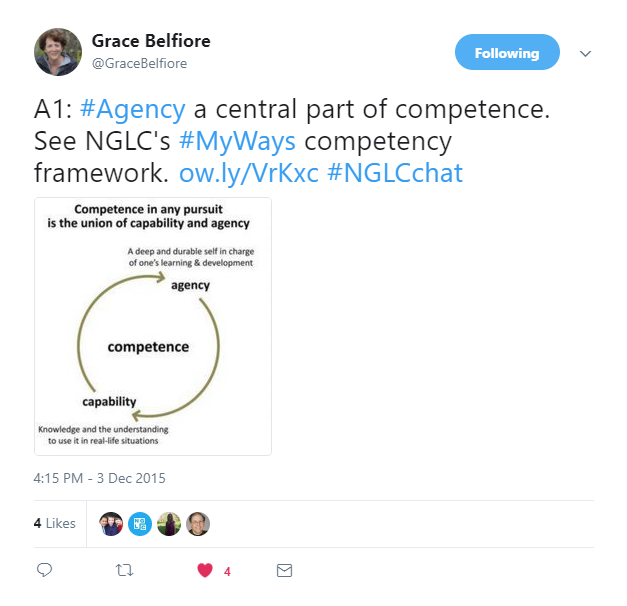
How often do we think of ourselves as deep and durable and in charge? How wonderful would it be to have a generation of deep and durable and in charge citizen-learners in our midst?
Promoting Student Agency
This list includes strategies that guest experts and other participants shared as a way to describe what student agency looks like in the classroom and how schools can honor and encourage agency in the learning process, helping students learn not only that they can influence the world around them but also develop the tools and skills to do so.
- Reflection. Students reflect on their learning, make connections to their prior learning, and engage in ongoing conversation through writing and dialogue.
- Transparency. Students need to know where they are to know where to go.
- Scaffolded and thoughtful teacher prep. Agency looks and sounds different for every student, and prepared teachers can more effectively release control to students.
- Teacher modeling. Students need the support of their school leaders so teachers and administrators need to self-monitor as well.
- Self-direction. Students are empowered to work on their own or collaboratively on assignments and projects at their own pace. They engage in learning strategically without waiting to be directed.
- Choice. More than providing a menu of options, choice provides students with control leading tolower stress and more capable students.
- Growth. Students work in their zone of proximal development, at exactly their level, all day every day. There’s a school-wide growth mindset.
- Real roles. Agency lives when students take on the role of inventor, artist, scientist, scholar. Agency increases when we provide broader and deeper student experiences. Historically, this was more often found in extracurriculars than in the classroom. Today, classrooms may provide whole game learning opportunities.
Many thanks to everyone who provided these insights and resources including, but not limited to, the #NGLCchat guest experts!
- Grace Belfiore, Researcher and author, lead developer of MyWays project
- Dave Lash, Researcher and author, lead developer of MyWays project
- Andrew Miller, Consultant with Buck Institute and ASCD
- Casey Montigney, Teacher at Medill-Shue Middle School, member of the Carnegie Foundation’s Student Agency Improvement Community
- Michele Savage, Principal of Medill-Shue Middle School, member of the Carnegie Foundation’s Student Agency Improvement Community
Related Posts
How Project-Based Learning Can Support Student Agency - Authentic learning experiences, reflection, student voice and choice, and connections to community elevate project-based learning by honoring student agency.
How Competency-Based Learning Can Support Student Agency - When students design their own pathway, are free to fail/free to learn, and demonstrate mastery through self-directed assessment, student agency thrives.
How Blended Learning Can Support Student Agency - Blended learning puts students in the driver’s seat of learning by increasing their voice, choice, and motivation.


